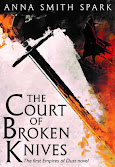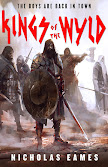The Black Mausoleum is the fourth dragon novel by Stephen Deas. The Dragon Queen will follow it next year in what looks to be a second trilogy for the US named Memory of Flames series. The book was released on August 16th.
Note: if you haven't read the first trilogy of dragon novels, the synopsis hints at some important elements of the story that you may want to avoid...
Kataros, the alchemist for The Order of the Scales is back. She's probably one of the most stable minds left and she seeks a solution for all humanity. She a strong female character and her motivations felt genuine. However, in this deathly environment she can't walk alone. That's where the Adamantine Men come along. One of them, Skjorl, is the cream of the cream as far as skilled badass dragon killers without mercy can be found. That kind of fearless bravado and dedication comes with a price, a blurred vision of reality and morality. Skjorl is intense but too much for his own good. His past is tainted and it clashes with some of his comrades, particularly Jasaan, a more balanced man.
To complete the cast, comes Blackscar the dragon and Siff, an outsider dust dealer meddling with things and people he shouldn't. His fate however is completely changed when he comes in contact with something related to the famed Silver King. He's also a troubled soul and when Kataros find herself in the company of Skjorl and him, a peculiar and messy group is formed. Interesting discussions will follow and Kataros has to use her power and wits to keep them in check while they travel to their goal. That whole dynamic is where the characters really shine and the narrative becomes veritably compelling.
The premise the book begin with is clear enough, dragons now have the upper hand. Fast enough, we discover a possibility for the return in control for the humans. However, when the novel concludes, even though the journey was interesting and the story deepened the dragon vs human perspective, the closure felt hollow. It ended up like a full-length epilogue of the first trilogy.
To add complexity and enrich the linear narrative, Deas uses a simple but effective device, it's told in the past, from a different time period depending on the point of view and the advancement of the tale. However, as simple as it may seem in theory, the organization behind it must be trying for the author, confusion could arise. The choice of point of view to use and at which time period becomes more imperative than usual. In my past reviews of the author's novels, I criticized that fact and blamed it on timing. This time, I think that he succeeded, even with this new artifice. My only problem was that some outcomes were pretty obvious.
Another aspect I liked in Deas' fourth adult novel set in his dragon world is the natural way in which the protagonists are speaking about the world, the locations, the people and their history. Recognition is felt more easily and even if it's typical in a fourth book in a series, I think the author is getting better at it. Sadly though, the only epigraphs recounting the history of his world are at the start of the sections of the book, they are not present in enough quantity, at least to suit my taste. Likewise, the exploration of blood magic, more extensive in The Black Mausoleum, could still use more scrutiny.
In the end, you can consider this new beginning a fast and entertaining read. A small contingent of colorful characters surrounded by dread tries to cope with an almost impossible situation. They are grasping for their old way of life desperately but the world is not what it used to be. In that context, if you like action and character driven plot with scorching fire around the corner, you'll be satisfied.
Technically, I think that the Gollacz looks good with what looks like Skjorl taking on a dragon. It is the work of Stephen Youll. The nice map of the dragon realms is still present and the paperback edition of the books stands at 352 pages.
Note: if you haven't read the first trilogy of dragon novels, the synopsis hints at some important elements of the story that you may want to avoid...
Two years have passed since the events of the Order of the Scales. Across the realms, dragons are still hatching. Hatching, and hatching free. Skorl is an Ember, a soldier trained from birth to fight dragons. He is a living weapon, one-shot only, saturated with enough dragon-poison to bring down a monster all on his own. Misanthrope, violent and a drunk, to fulfil his purpose and slay a dragon, means to be eaten. Now Skorl has a choice: he can hang for his crimes, or he can go with the last of the Adamantine Men, fighting against an enemy he was born to face. Rat is an Outsider. He's on the run and he's stumbled onto something that's going to make him rich beyond all his dreams. It's just a shame that the end of the world has started without him. Kataros is an alchemist, one of the order responsible for keeping the dragons in check. One of the order that has just failed, and disastrously so. Two men, one woman. One chance to save the world from a storm of dragons ...The Black Mausoleum marks an important change in term of storytelling and structure for Deas. Not only the world where his first trilogy took place is forever changed, but also the majority of crucial players have left the board for good. That new slate feels like the perfect situation for the rise of new protagonists with life as a prey to live with, everything to gain and still much to lose, victims of the aftermath. In the interview I made with the author, he said that he wanted to explore a world where dragons soar from a different perspective. He achieves this goal in a totally new manner with this story, while the characters are still at the front. I may repeat myself from the Order of the Scales review but here's what he had to say back when The Adamantine Palace was released:
"[...] I think the story is very much about the impact that dragons have on the people around them, although perhaps not in the most obvious ways. Yes, they can burn cities and eat villages and still be hungry, but I'm thinking more about what it's like to live in a world where you have these monsters at your beck and call – and to always know they're only a few un-drugged weeks away from razing your entire world to the ground."Five characters take the spot as the points of view throughout the story, a number not so far from the previous three novels. Moreover, the pace is still mostly hasty, the chapters are short, the prose is harsh and biting, the action bloody and the world feels more dangerous than ever. This action element is the key to The Black Mausoleum. The book is centered on it and this time there's no balance with political intrigue. In conjunction with the fact that for this quintet, a dragon among them, a single quest brings them together, I felt that the scope was slightly too narrow and the proposition not deep enough.
Kataros, the alchemist for The Order of the Scales is back. She's probably one of the most stable minds left and she seeks a solution for all humanity. She a strong female character and her motivations felt genuine. However, in this deathly environment she can't walk alone. That's where the Adamantine Men come along. One of them, Skjorl, is the cream of the cream as far as skilled badass dragon killers without mercy can be found. That kind of fearless bravado and dedication comes with a price, a blurred vision of reality and morality. Skjorl is intense but too much for his own good. His past is tainted and it clashes with some of his comrades, particularly Jasaan, a more balanced man.
To complete the cast, comes Blackscar the dragon and Siff, an outsider dust dealer meddling with things and people he shouldn't. His fate however is completely changed when he comes in contact with something related to the famed Silver King. He's also a troubled soul and when Kataros find herself in the company of Skjorl and him, a peculiar and messy group is formed. Interesting discussions will follow and Kataros has to use her power and wits to keep them in check while they travel to their goal. That whole dynamic is where the characters really shine and the narrative becomes veritably compelling.
The premise the book begin with is clear enough, dragons now have the upper hand. Fast enough, we discover a possibility for the return in control for the humans. However, when the novel concludes, even though the journey was interesting and the story deepened the dragon vs human perspective, the closure felt hollow. It ended up like a full-length epilogue of the first trilogy.
To add complexity and enrich the linear narrative, Deas uses a simple but effective device, it's told in the past, from a different time period depending on the point of view and the advancement of the tale. However, as simple as it may seem in theory, the organization behind it must be trying for the author, confusion could arise. The choice of point of view to use and at which time period becomes more imperative than usual. In my past reviews of the author's novels, I criticized that fact and blamed it on timing. This time, I think that he succeeded, even with this new artifice. My only problem was that some outcomes were pretty obvious.
Another aspect I liked in Deas' fourth adult novel set in his dragon world is the natural way in which the protagonists are speaking about the world, the locations, the people and their history. Recognition is felt more easily and even if it's typical in a fourth book in a series, I think the author is getting better at it. Sadly though, the only epigraphs recounting the history of his world are at the start of the sections of the book, they are not present in enough quantity, at least to suit my taste. Likewise, the exploration of blood magic, more extensive in The Black Mausoleum, could still use more scrutiny.
In the end, you can consider this new beginning a fast and entertaining read. A small contingent of colorful characters surrounded by dread tries to cope with an almost impossible situation. They are grasping for their old way of life desperately but the world is not what it used to be. In that context, if you like action and character driven plot with scorching fire around the corner, you'll be satisfied.
Technically, I think that the Gollacz looks good with what looks like Skjorl taking on a dragon. It is the work of Stephen Youll. The nice map of the dragon realms is still present and the paperback edition of the books stands at 352 pages.
The Black Mausoleum review score :
Characterization............. 8 /10
World building............... 8 / 10
Magic system................. 7.5 / 10
Story.............................. 7 / 10
Writing........................... 8 / 10
Overall (not an average) 8 / 10
Enjoy!
Stephen Deas page
The Adamantine Palace review
The King of the Crags review
The Order of the Scales review









0 comments:
Post a Comment